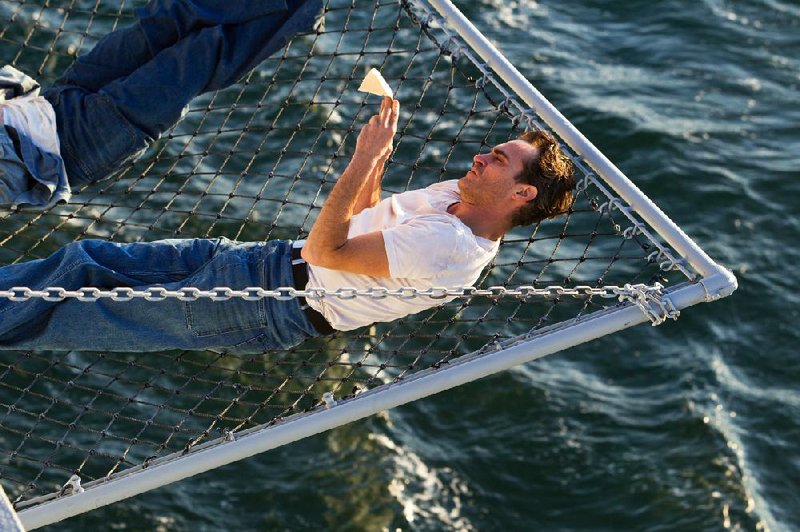LITTLE ROCK — The Master
90 Cast: Joaquin Phoenix, Philip Seymour Hoffman, Amy Adams, Jesse Plemons, Laura Dern, Kevin J. O’Connor, Patty McCormack Director: Paul Thomas Anderson Rating: R, for sexual content, graphic nudity and language Running time: 137 minutes
There’s a moment in Room 237, the excellent new documentary concerning the obsessive nature of fans of Stanley Kubrick’s 1980 horror masterpiece The Shining, where one cultural academic is talking about Kubrick’s mindset going into the making of the film.
The critic’s position is that by the end of the ’70s, Kubrick — who already had achieved phenomenal success with Dr. Strangelove, A Clockwork Orange and 2001 — had become bored by the medium, that he needed to discover a new way of making a film and telling a story, and The Shining, which is considered one of the pre-eminent horror flicks in cinematic history, came directly out of that impulse.
A similar dynamic is at work with Paul Thomas Anderson, who, at the tender age of 42, has already become one of this country’s greatest living filmmakers. After the wild success of Boogie Nights back in 1997, the director has moved on to ever more challenging filmic terrain. Magnolia was a sprawling Altman-like meditation on human synergies and the dissolution of connection; Punch Drunk Love, was an off-kilter love story about a thoroughly off-putting man-boy who falls in love and doesn’t have the emotional maturity to deal with it; and his last film, the Academy-Award nominated There Will Be Blood, is a study of American capitalism in the form of one, hardened oil baron and his misbegotten son.
In the five years since his last film, speculation about Anderson’s next project has been rampant, but whatever you might have heard about it, you’re still likely to be astounded — if not a bit perplexed. He has crafted a superbly willful film that will likely confound your expectations, no matter what they might have been.
Despite the glut of rumors to the contrary, the film is less about the beginnings of Scientology than it is about the relationship between two men: Freddie Quell (Joaquin Phoenix) is a former sailor, discharged from the Navy after World War II into a world that he seems forever at odds against. A raging alcoholic with a penchant for distilling his own hooch out of whatever he can find on hand — including paint thinner, photo lab chemicals and Lysol — his self-destructive impulses are boundless. Whatever job he has — a department store photographer, a cabbage picker — he establishes himself just long enough to learn the standards and rules he can later eviscerate when he goes off the rails.
One fortuitous night, he sneaks aboard a large yacht, commissioned by a powerful orator named Lancaster Dodd (Philip Seymour Hoffman), a man who describes himself as “a writer, a doctor, a nuclear physicist, a theoretical philosopher.” Improbably, they hit it off and spend the next couple of years enmeshed, as Dodd travels throughout America preaching his brand of pastlife suppression therapy and self-determinism with his believer wife (Amy Adams), his loyal-but-realistic son (Jesse Plemons) and his growing cadre of acolytes, with Freddie acting as sort of the physical enforcer of the burgeoning movement.
Through it all, Dodd never loses faith in Freddie, even as Freddie continually gives him precious little reason to trust him. Still boozing, and flying off the handle at anyone who dares challenge Dodd’s bizarre institutions, Freddie plays the violent, unbridled id to Dodd’s smooth superego, that is, until things take a turn, and the two men find themselves at considerable odds.
As odd as it may seem, as thoughtfully idiosyncratic as it presents itself, Anderson’s film is much in keeping with his last film. If Blood was about capitalism’s ruthless domination of this country in the early part of the 20th century, The Master is about the resultant spiritual and psychic turmoil left in capitalism’s wake. People start looking for answers, it would seem, exactly the kind of environment in which men like Dodd can begin to wield a new and potent kind of power.
Stylistically, the films are also linked well beyond the excellent and unnerving score by Radiohead’s Jonny Greenwood, who also scored Blood. Standard storytelling techniques — including such Hollywood standbys as character arc and narrative through-line — are eschewed in favor of a much more distinctive style. We don’t have scenes of exposition, exactly, and we don’t really have a story, per se. What we do have is a growing understanding of these two men and the push/pull they exert upon each other (Dodd: “We’re tied together”), like a planet and a moon vying for the same gravitational vortex.
We also have extraordinary performances from two of this country’s most absorbing and thoughtful actors. Hoffman plays Dodd as a man who feels he has so much to give to the world the weight of his own expectation is excruciating; while Phoenix — without question, the most uninhibited actor of his generation — sinks so deep into Freddie’s psychosis, you worry if he’ll ever fully emerge from those depths. He plays Freddie with the perpetual snarl of a halfsmile and a slight hunch to his shoulders, his bone-skinny frame constantly twitching and gyrating with animal ferocity. He even adopts an era-appropriate style of standing in repose, with his hands high up on either side of his slender rib cage like something out of a Dorothea Lange photo, suggesting a calm that never materializes.
His is a wild spirit, untamed and unaccountable, and, as much faith and care as Dodd pours into him — including, in one astonishing scene, the beginning of his self-developed, confrontational style of therapy (“Do your past failures bother you?”) — Freddie, like Alex, the deranged and incorrigible thug who is the main protagonist in another one of Kubrick’s masterworks, A Clockwork Orange — remains beyond help and reformation, his demons unable (and unwilling) to be exorcized.
MovieStyle, Pages 33 on 09/21/2012

